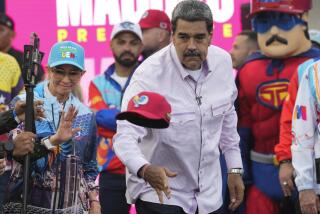Contras Drafting Political Program
SAN JOSE, Costa Rica — The civilian wing of the U.S.-backed Nicaraguan rebel movement opened a two-day assembly here Monday to draft a political program that its leaders say would be the basis for their government if they oust the Sandinista regime in Managua.
Leaders said that the assembly of the United Nicaraguan Opposition will be working to bolster the legitimacy of the contras, the movement’s guerrillas, who have been accused of fighting the leftist Sandinistas in the countryside without a set of clear political objectives.
Representatives of eight U.S. congressmen and senators attended the assembly as observers at the rebel organization’s expense, according to spokesman Ernesto Palazio. About two dozen politicians from Central and South America also were brought here to observe.
“These are steps toward legitimacy, internally and externally,” contra leader Arturo Cruz said in an interview.
“In this stage of the war, politics is fundamental. We need the backing of Central America. If we get that, it’s going to be easier to get a consensus in the United States,” Cruz said.
The United Nicaraguan Opposition, widely known by its initials UNO, is an umbrella organization of anti-Sandinista activist groups, including 13 exiled Nicaraguan political, labor and business organizations in addition to guerrilla outfits.
The group is headed by Cruz, Alfonso Robelo and Adolfo Calero. Its assembly of 28 representatives of the civilian groups under the umbrella was formed in July to function as a rebel legislature.
Calero, who represents the largest and best-armed contras organization, the Honduras-based Nicaraguan Democratic Force, could not attend the meeting because Costa Rica considers him a military leader and would not give him a visa.
The assembly’s draft political program calls for free elections, supervised by the Organization of American States, separation of powers in government and the protection of civil liberties and human rights.
It also includes points not generally associated with the armed contras--the “progressive reduction” and ultimate elimination of the army, a state “regulating” role in the economy and agrarian reform.
Assembly leaders, seated under a banner that read “Without Democracy in Nicaragua There Will Be No Peace in Central America,” said they are committed to democracy and political pluralism.
“People working in the present government should not fear reprisals,” Fuad Farach, the assembly president, said. “We are authentic democrats.”
Farach said the assembly wants national reconciliation, a euphemism for dialogue with the Sandinistas.
Most military and political observers in the region agree that the contras are far from any kind of military victory that could bring them to power. The Sandinistas refuse to negotiate with them, saying they are a mercenary force of the United States.
Congress has approved $100 million in military and economic aid for the contras this year and authorized the CIA to direct the use of that aid. About 70 contras are reportedly receiving military training in the United States at present.
“The challenge we have is to demonstrate that we are deserving of this aid,” Cruz, a former Sandinista government official, told the assembly. He said he believes that more aid would be forthcoming “if we act with determination, in a positive form, demonstrating legitimacy and viability.”
Cruz called for “unity, unity, unity” and urged collaboration with a Costa Rica-based rebel group, the Southern Opposition Bloc.
Cruz and Robelo, the latter also a former Sandinista government official, have been at odds over political control of the rebel movement with Calero. The latter is a businessman who led a civic uprising against Nicaraguan dictator Anastasio Somoza that paved the way for the Sandinistas’ revolutionary victory in 1979.
Although the United Nicaraguan Opposition nominally oversees all rebel activities, Calero’s group last summer formed a council of military commanders that apparently limits the umbrella group’s control over the armed guerrillas.
Rebel sources said most of the assembly members also are allied with Calero’s Nicaraguan Democratic Force, which is the most conservative rebel faction.
More to Read
Sign up for Essential California
The most important California stories and recommendations in your inbox every morning.
You may occasionally receive promotional content from the Los Angeles Times.










